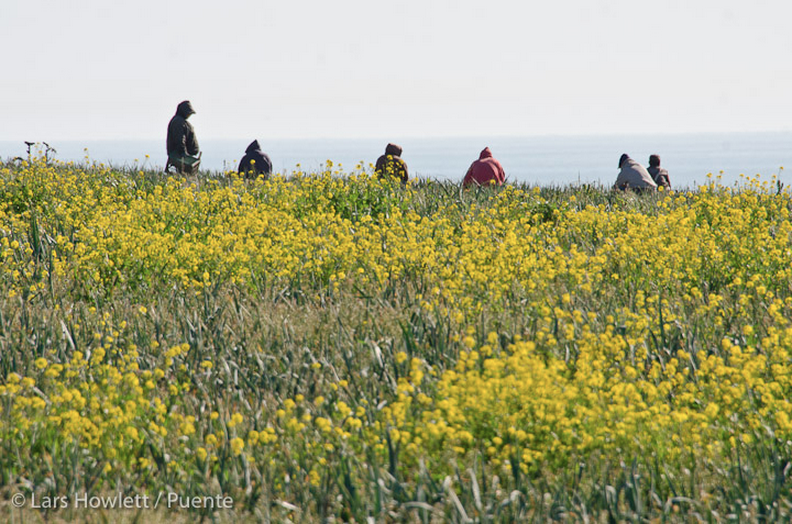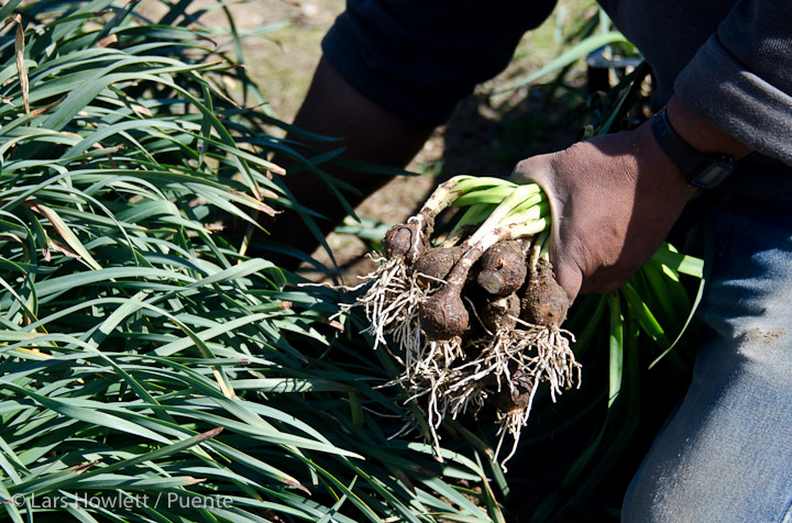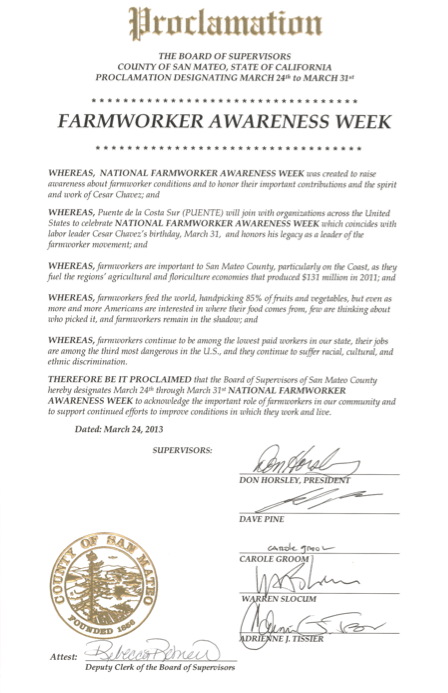Profiles of South Coast Farmworkers
Day 3- National Farmworker Awareness Week
(Names have been changed to protect the privacy of individuals.)

Marcos and Efraín are neighbors from the same town in Mexico. They arrived together to Pescadero about six weeks ago after ten days of travel including seven days of walking. They were drawn to the area because they both have family members working at the same ranch, and were told there would be work picking Brussels sprouts, and that it was a nice place. The two men had been in the U.S. before, but this was their first time to California.
Both had similar agriculture jobs in Mexico, but only earned a fraction of what they earn here. “The $8-$10 we earned daily there was hardly enough to get through that day. Here we earn enough to support the daily needs of our families as well as save some.”
Marcos has two children ages 12 and 5, and Efraín also as two children, ages 9 and 6. “Being far from my family is the hardest part. People suffer in Mexico beginning with the first step they take from their door. We are suffering here too, but in different ways. Living in very tight quarters in an isolated place is tough. But it’s for our families, so it’s worth it.”
Efraín plans on staying for two years and Marcos for three years. “Although some form of legalization would be great!” they both agreed and have hope that the recent discussions by our government leaders will turn into something real during their stay.
When asked about the help Puente provides, Marcos said, “It’s very appreciated. I tell my wife about the support we get here [from Puente]…she is surprised to hear it, no one supports her like that in Mexico.”
Profile of a South Coast Farmworker

Day 1- National Farmworker Awareness Week
(Some names have been changed to protect the privacy of individuals.)
When Pedro first arrived to the United States in 1983, he worked picking tomatoes in fields near Chula Vista, California. In those days, conditions for farmworkers were different and Pedro lived for months, along with other farmworkers, on the banks of a creek under a roof made out of a blue tarp, often in harsh weather. This was the first of many work trips to this country.
Why did he leave Mexico?
Pedro is originally from the Mexican State called Guanajuato. He saw no future in agriculture and began working sewing in a nearby town. He tried many jobs in Mexico including laying pipeline near Guatemala. When he got married he realized he couldn’t provide for his family and came back to the United States, this time near Fresno. Pedro was picking olives, oranges, and grapes, among other crops. Like many farmworkers in those years, he followed the harvest. This time, he was living in a car.
On one of his last trips, he arrived in Pescadero, California because some friends and brothers-in-law lived here. That year, he learned that an amnesty had passed and that he qualified to get a work permit. For several years he’d go to Mexico to visit his family for a few months and come back to work the rest of the year. “I was also sending money home every time I got paid. I was always very responsible with my family duties,” Pedro said.
“The life of farmworkers is the hardest job and the worst paid.”
Pedro witnessed many hardships during his life as a farmworker: farmworkers got dehydrated and simply collapsed in the fields, job sites lacked bathrooms, drinking water and rest times. One time, a girl fell from her place sleeping on a tractor from exhaustion. The tractor driver didn’t see her and she was killed.
“Things are way better now,” he comments after these remarks. Pedro mused about Cesar Chavez and his contributions to that reality. “It made me feel joyful to know that he was out there advocating for us.”
After years of farm labor, Pedro became the night shift driver for the farm where he has worked for more than 10 years. Still, he often holds second jobs. Pedro knows California’s agriculture is very important for the United States and the world but he says, “People buy produce and they have no idea about the hands that harvested it. I would like people to know how hard is to get the produce to their table.”
Pedro became a citizen about five years ago. However, he has not found a way to get legal residency for his wife, who lives here with him. “It is very depressing for her. I see her suffer, even cry, especially when there is a holiday in her native Mexico town and she cannot go and visit her family. Now, I can go and I take my daughters that were born here, but she has to stay behind every year.”
There are good things that come with the job, though, he says. “My family lives better now.” But, “I see the system as very broken… Farmers need the labor force and most U.S. citizens will not take those jobs. We need the jobs. It is a need for us so we do the job. That’s life.”





